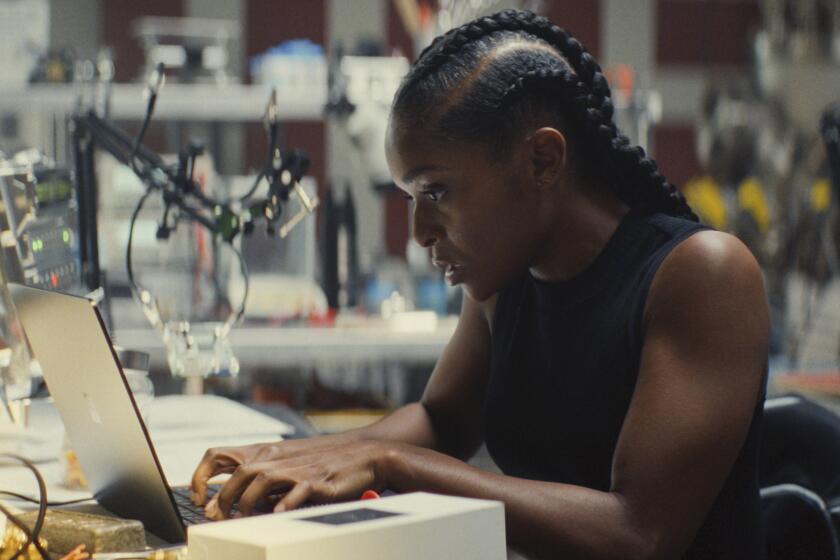How one game fights the millennial burnout epidemic
- Share via
Anyone who is offended by the “OK, boomer” meme may want to stay away from “Mosaic.”
Beyond its representations of the haves and have-nots, there are depictions of daily life that show such deep chasms between classes and generations that one wonders if a bridge can ever be built. “Mosaic,” a tale of corporate drudgery, low salaries and opportunities that will never materialize, falls into the latter, arguing, to quote Generation X band Pulp, “The future that you’ve got mapped out is nothing much to shout about.”
It’s heartbreaking, and can be stressful for those living paycheck to paycheck. Health insurance, for instance, is advertised here as not an actual benefit but simply something that can help one avoid an unexpected $4,000 bill. A dating app called “Love” is shown to be built by those with bullying, outdated beliefs on gender, and reveals the great tragedy of our tech-enhanced romantic age: Any momentary elation brought by a “match” is immediately leveled by the thousands of swipes that went nowhere, the days and nights met with zero notifications. I “liked” 28 digital caricatures in “Mosaic”; I was disliked by 474, at least before I stopped checking. Dating apps, of course, don’t tell us how many swiped left, but “Mosaic” reminds us it’s implicit in their design.
That hit close to home. As did my character’s reticence at opening the mailbox for fear of finding a bill inside. And there was this question put to my slouchy dude: “When was the last time you spoke to another human being?”
It was implied that coworkers didn’t count, and as the hours I tallied grew greater than 50, I started to wonder if “Mosaic” was actually good for my mental state. And though its characters go to work when it’s dark and return home when it’s darker, I decided it was, for that question came from a goldfish, and that goldfish lived in my pocket, at least when I wasn’t flushing it down the toilet (this would serve only to temporarily annoy the fish).
One of a string of games this year that have shown us how technology is driving us into despair — “Neo Cab,” “Eliza” and even blockbuster “Death Stranding” among them — “Mosaic” joins the pity party but brings a Michel Gondry-like trippiness to the affair, where skyscrapers zig and zag, street performers become bathed in wondrous light, and just when you’re ready to turn it off and have a cry, after a man and a woman ever-so-slightly turn away from us as soon as we enter an elevator, we embark on a maze of gardens and light that end with us hugging ourselves.
“Mosaic” doesn’t want to harm us as much as it slams our data-driven tendencies. Workers are depersonalized to the point that they’re slots on a spreadsheet, their performance judged solely in numbers and ratings. For when everyone is organized via rankings, we can forget they can actually hurt.
Money too becomes a joke to ignore, only because our lead character will forever be unable to pay any of his bills. “Mosaic” isn’t a strategic simulation that offers a potential way ahead. There isn’t one, and only the protagonist’s apparent dive into insanity — he is talking to a goldfish, after all, and at another point becomes a waddling suitcase — saves his sanity. Ultimately it’s his imagination, with the help of some playful stray cats, that help free him.
With Apple listed as a producer — “Mosaic” is on Apple Arcade, the tech giant’s subscription service, but coming to consoles in 2020 and home computers in early December — I was mildly amused that the house built by Steve Jobs would have a hand in such a cynical takedown of our modern way of life, a game that goes so far as to show us how we as a society have turned our back on the homeless.
In a more passive medium, “Mosaic” would feel oppressive, lacking any of the natural human warmth present in disturbing works such as Spike Jonze’s “Her.” But each morning in “Mosaic” greets us with a choice: Flush our talking fish friend down the toilet or bring it with us. That’s what powers us through. The very nature of the interactive medium provides optimism, reminding us we still have decisions to make even when the world may imply they’ve been made for us.
Games
'Mosaic'
More to Read
The biggest entertainment stories
Get our big stories about Hollywood, film, television, music, arts, culture and more right in your inbox as soon as they publish.
You may occasionally receive promotional content from the Los Angeles Times.











